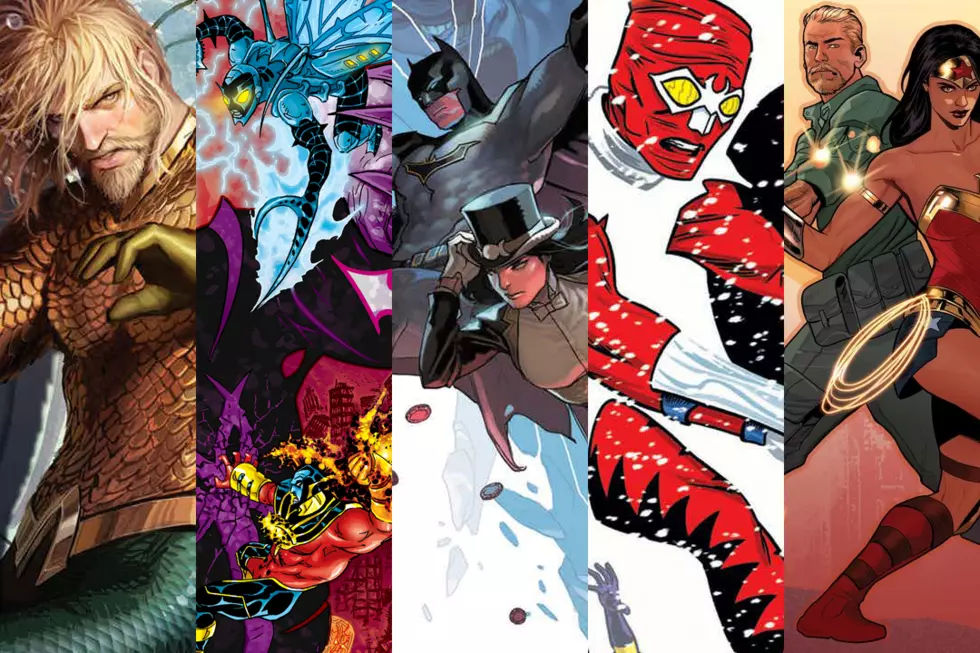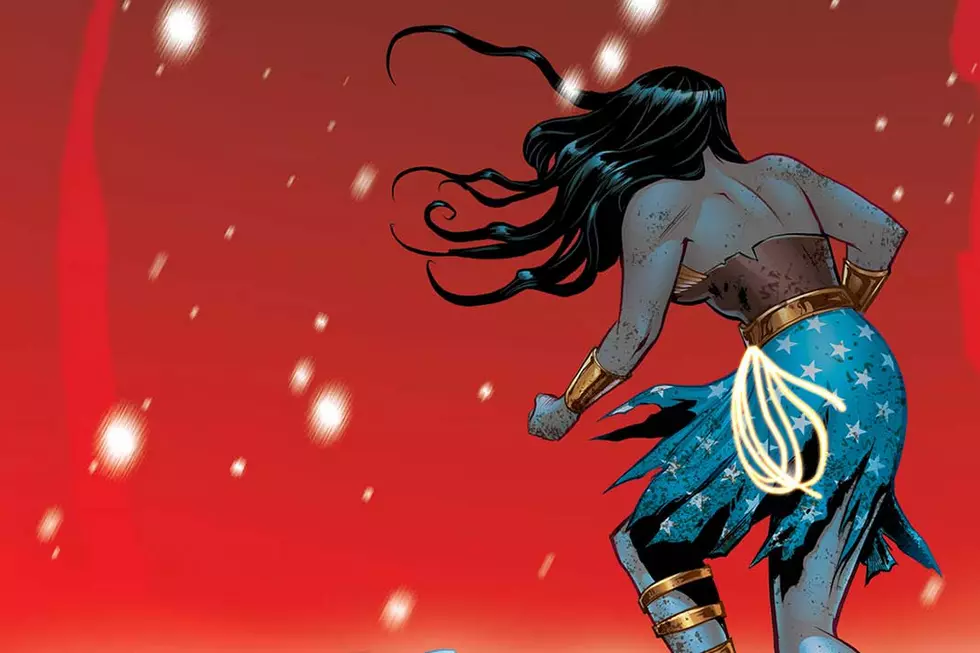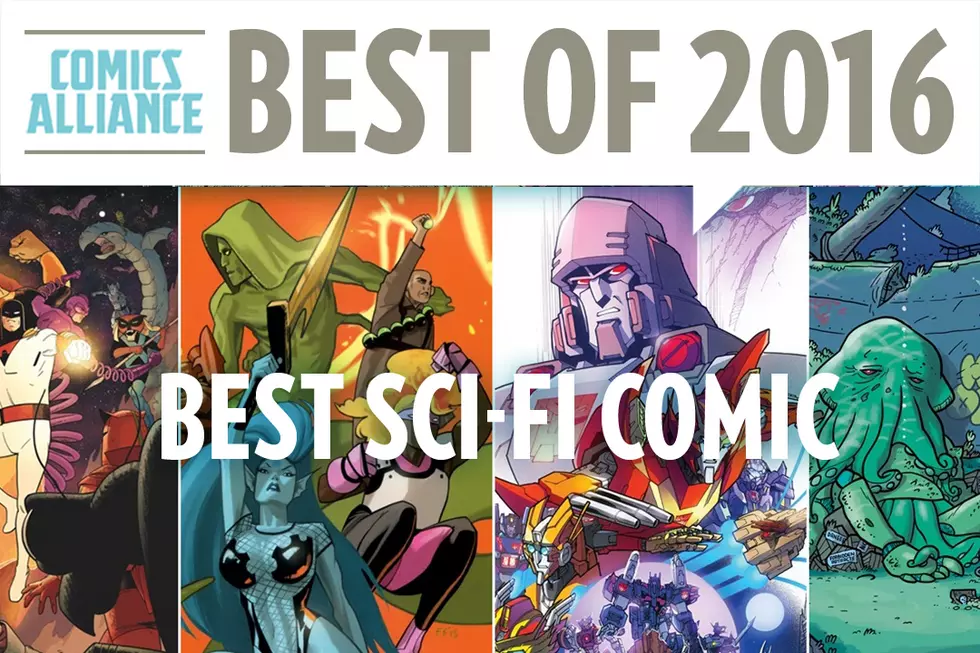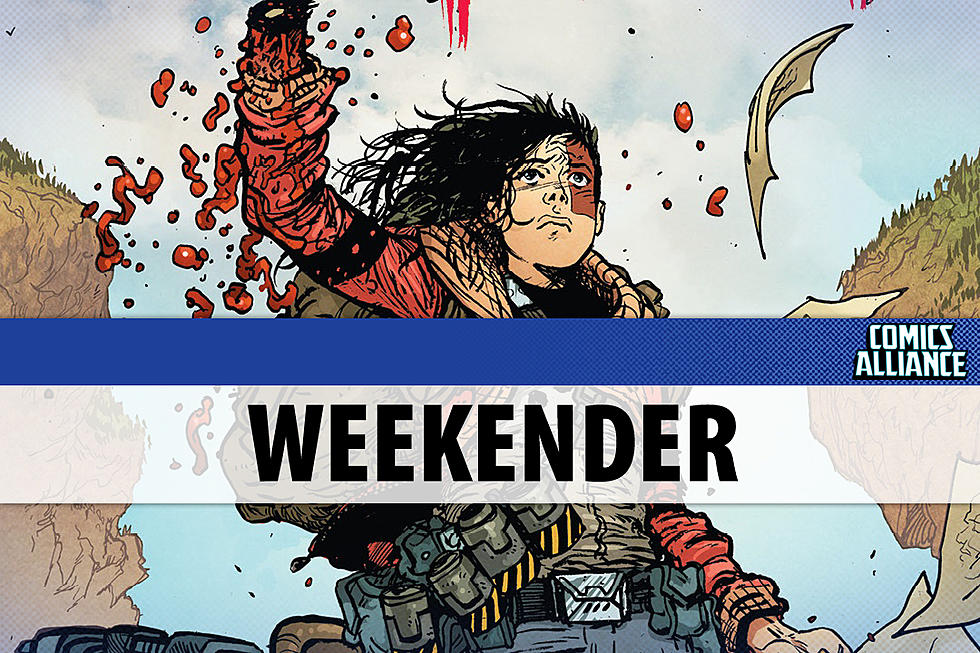
Thought Bubble #5: How Much Should A Comic Book Cost?

The comics medium attempts to answer a lot of big questions: If you could change anything in history, what would it be? What would it be like to live among gods? Is he strong? (Listen, bud, he's got radioactive blood.) In that spirit, ComicsAlliance's Matt Wilson is asking comics creators, retailers and commentators some big questions of his own.
In this installment, digital comics pioneers Chris Roberson, Tim Seeley, Mike Norton, Zander Cannon and Kevin Cannon, and retailers Richard Neal and Terry Gant answer the question: What's a fair price for a print or digital comic book?Most 20-to-24-page comics you find on the shelf at comic shops today cost $2.99 or $3.99, depending on paper stock, ad content, the popularity of the title, and maybe some augury. It's hard to tell what necessitates the dollar difference sometimes. Either way, fans are paying considerably more for their print comics now than they have in past decades. According to a May study by culture blog The Awl, the price of a comic book, adjusted for inflation, has been anywhere between three and four bucks in 2012 dollars since the late 1990s. But in 1995, the going rate was around $2.00. In 1985, it was equivalent to $1.39. And in 1962, when the cover price was a 12 cents, that was like paying 86 cents today.
While print-issue cover prices and their companion digital versions stay in that three-to-four-dollar range, publishers and creators of digital-only comics are experimenting with prices as low as a single buck. As that potentially game-changing experimentation takes place, I asked our panel for their thoughts on the landscape of comic book pricing.
Tim Seeley (Co-founder of Four Star Studios and co-publisher of Double Feature)
I think 99 cents is the going, accepted price for a unit of digital content, and I think comics, sans the need to print on paper, should be able to adopt that. For print books, I think $2.99 is the maximum we should be charging readers, but, on the other hand, a lot of fans don't seem to mind paying $3.99, so they'll continue to get what they support.
 Kevin Cannon (Co-creator and co-publisher of Double Barrel)
Kevin Cannon (Co-creator and co-publisher of Double Barrel)
I think one dollar is a fair price point for a 24-page digital book from one of the big mainstream book publishers, and I'd gladly shell out two bucks for an indie publisher and maybe higher if the ebook is being self-published by an indie creator. Before starting Double Barrel, I would have loudly exclaimed that no ebook should cost more than a quarter, but that's before I realized how much money is paid to the various distributors. And that's not to knock them -- they should be paid for providing a service -- but it means that a dollar is about as low as you can go while still being able to give the publisher and artist a fair cut.
As for a printed book, I'd be willing to pay two bucks for a mainstream book and five from a small publisher. As for self-published books, I'd be willing to drop five-to-15 dollars, especially if the artist has produced it him or herself, silk-screened the cover, etc.; at that point it becomes an art object on top of being reading material.
 Richard Neal (Owner of Zeus Comics in Dallas, Texas and co-creator of The Variants Web series)
Richard Neal (Owner of Zeus Comics in Dallas, Texas and co-creator of The Variants Web series)
As a retailer, I want the prices between print and digital to remain competitive. Whether that's at $2.99, $3.99 or cheaper. Marvel did something very clever by adding the digital code to all their $3.99 books. Prior to this, both big two publishers were targets online and in-store to folks complaining about increased prices. Yet I didn't see the same complaints leveled at the smaller publishers making the $3.99 jump. What about the consumers' concepts accepted a larger price point from the smaller publishers but not the big two? If they grasp the concept of volume then they fail at digital pricing. We've been spoiled by $0.99 and $1.99 price points online. Sure, you can take out printing expenses or distributors like Diamond, but there are other expenses in the digital landscape like infrastructure and third parties like iTunes and comiXology. Someone's going to take a third or more of the publisher's money if they can't sell direct to the consumer.
The risk in digital is and always will be ownership. Until the landscape levels some, there's too many players competing for the digital dollar. And as such, the risk is your content will become obsolete or taken away. PSP comics store anyone?
What I like about the Marvel offer is they've added value to the $3.99 price. I think all comics should come with a digital code instead of forcing consumers to choose between print or digital or double buying. Under that scenario, ownership risk is eliminated. When the publishers generate digital codes they become the gatekeepers of their digital content independent of third parties like comiXology. If a third party falls, the publisher can move their content and consumers easily to another source. Plus, you still have your print copy for non-guided-view viewing.
 Chris Roberson (Co-publisher of MonkeyBrain Comics)
Chris Roberson (Co-publisher of MonkeyBrain Comics)
The simplest answer is that a "fair price" is whatever readers are willing to pay. For readers, the question usually boils down to a question of fair exchange. That is, are they getting their money's worth? Is the price they pay equal to the enjoyment they derive from reading it? But even there, there are several variables at play, such as, are they purchasing a digital license to read the work electronically, or getting a physical copy that they could conceivably resell? Is the comic book festooned with ads that interrupt the flow of the reading experience? Does the printing quality "feel" as if it is worth the price?
But on the publishing end, the question becomes even more complicated. At the simplest level, the retail price of any commercial good has to pay the retailer who stocks and sells it, the distributor who supplies it, cover the cost of manufacturing it (printing it, in the case of comics), and then cover the expense of making it in the first place. In the simplest formulation, taking the hypothetical example of a self-publisher who writes and draws their own comics, has them printed at their own expense, and then sells them direct to readers, the cost is fairly easy to calculate: the retail cost is the unit cost of printing plus whatever the self-publisher feels their time and effort is fairly worth. But the more people involved in the creation and distribution of a comic, the more complicated the calculation becomes. And in the case of large corporate comic book publishers in the present day, who maintain immense staffs for editorial, marketing, sales, production, and so on, there are even more costs that need to be factored into any pricing decisions.
And the other partners in the supply chain have their own considerations, as well. Retailers need to be able to realize enough profit from the sale of a particular title to justify the space it occupies on their shelves. Distributors need to be able to recoup the costs of storing and shipping. And so on.
There are economies of scale at work, as well. The more individual units of a title are sold, theoretically, the lower the price can be set, and the fewer units sold the higher the price has to be. As comic sales overall have trended downwards, the total cost burden for producing and distributing the comics have been carried by fewer and fewer unit sales, meaning a higher price for each individual copy.
Digital distribution changes the equation, but it doesn't always simplify it. The material costs of printing physical copies is eliminated, but there are additional costs incurred in taking the files and making them ready for download (as in the case of comiXology's "Guided View," which requires someone to determine how the digital reader navigates panel-by-panel through a page), and the costs associated with electronic storage, technical support, software and application development, and so on must be accounted for, as well.
Speaking only for myself, I think these kinds of discussions are frequently counterproductive because participants are often engaged in two or more conversations at once. They might think they're talking about the same thing, but they're not. Even something as simple as people holding different definitions in their heads about what constitutes a "comic book" would lead to wildly divergent answers to your questions. Does "comic book" equal 22 pages, and if so what changes in the equation if the page count is shortened to 20, or lengthened to 24. Does a story that is serialized in 8 page chapters count as a "comic book?" Is it fair to charge $3.99 for eight pages of story? Does it make sense to demand that 22 pages of story be sold for $0.99?
So what's a fair price for a comic book? Ultimately, it's whatever readers are willing to pay, on the one hand, and whatever publishers and creators can get away with charging, on the other. Beyond that, it's complicated!
 Mike Norton (Co-founder of Four Star Studios and co-publisher of Double Feature)
Mike Norton (Co-founder of Four Star Studios and co-publisher of Double Feature)
$2.99 for print seems like a maximum. I don't have a problem, personally, with plopping down some dough for a comic, but as they get smaller yet more expensive, I don't really see point of paying so much for a monthly when you can usually get a collection for cheaper. Digital comics that are as expensive as print comics is crazy to me. I understand why it's like that, but it keeps me from getting a lot of comics that way.
Zander Cannon (Co-creator and co-publisher of Double Barrel)
What I think is fair has a lot to do with the structure of content rather than straight price. If a book has a self contained story, a solid episode that concludes nicely, or a meaty, substantive chapter, I'm much less fussy about what it costs. $3.99 or $4.99 for a print book that has one ore more of those qualities is very fair in my opinion. Scale that back to one or two dollars (maximum, for the lengths we're talking about) for a digital offering, since you don't get to hold it in your hand, it's DRM-protected, etc. and that seems about right. But something where it's just "more content" in an ongoing story makes it hard to really feel like you're getting something for your money, particularly these days, when there's so much content competing for attention. You're merely accumulating pages, so you might as well wait until you can pay $20 and get a trade, which usually has a self-contained story, a solid episode that concludes nicely, or a meaty, substantive chapter.
 Terry Gant (Owner of Third Coast Comics in Chicago, Illinois)
Terry Gant (Owner of Third Coast Comics in Chicago, Illinois)
Personally, I think the perfect price point is $2.99 for a standard comic, and if it happens that a book is going to be printed on better paper or if a company is going to provided extra content, then $3.50. I don't think there's a need in the market for any comic to come in above $3.50 and for the most part, given the over all quality of the product and the industries reliance on sales gimmicks, like events, short term creator splashes, etc., I think I'm right.
But here's the thing. Looking around my shop, I'm stocking upwards of 150 titles between Marvel, DC and the smaller major companies, and I'm not a full line shop. Based on performance alone, one-fifth of those titles had no shot at real sustained success, due to price, market interest beyond the first issue and price point. For these titles it would probably have been best to just publish them exclusively for the digital market at a lower price for, say, $1.00. Some of these are limited series and they'd only be going five-to-eight issues anyway.
I think DC and Marvel have a problem finding a way to reach that interim reader market. The group that's past Superman Adventures but not ready for Batman: The Dark Knight or Secret Avengers. What is easily accessible to kids old enough to get themselves to the shop but still need their comics vetted by some parental figure or adult? There isn't much being produced at a low price point by the Big Two. I think for $1.99 DC and Marvel should have a line of in-continuity comics -- not that kids care, but because now the collecting starts and why not have it matter?
Here are some examples: For DC, Batman Family, Superman Adventures, Blue Beetle, Firestorm, Young Justice Justice League of America, Shazam, Wonder Woman Adventures. For Marvel, Spectacular Spider-Man, Marvel Team Up starring Captain America, Avengers Assembled, X-Men United, Fantastic Foundation, Power Pack, Ms. Marvel and her Amazing Friends (a lady Marvel team-up concept), Iron Man Armored Adventures. All of these could be sold for $1.99, printed on newsprint and shelved in a section not called "kids." House style can be used to draw/write them and sales would be strong even with older readers. I'd be willing to donate a significant amount of shelf space to these comics as they'd replace lesser performing titles.
DC and Marvel both would be getting the new generation of readers they have been failing to reach for years, and the the best part would be that after a few years, many readers will transition to the standard comics line and gladly pay the extra $1.00 or $1.50.
More From ComicsAlliance


![A Jealous Robin Heads To Bludhaven In ‘Nightwing’ #16 [Exclusive Preview]](http://townsquare.media/site/622/files/2017/02/NTW_Featured.jpg?w=980&q=75)





![DC Reveals The Batman Family’s March Covers, Including ‘Batgirl Annual’ #1 And ‘All Star Batman’ #8 [Exclusive]](http://townsquare.media/site/622/files/2016/12/Previews00.jpg?w=980&q=75)
